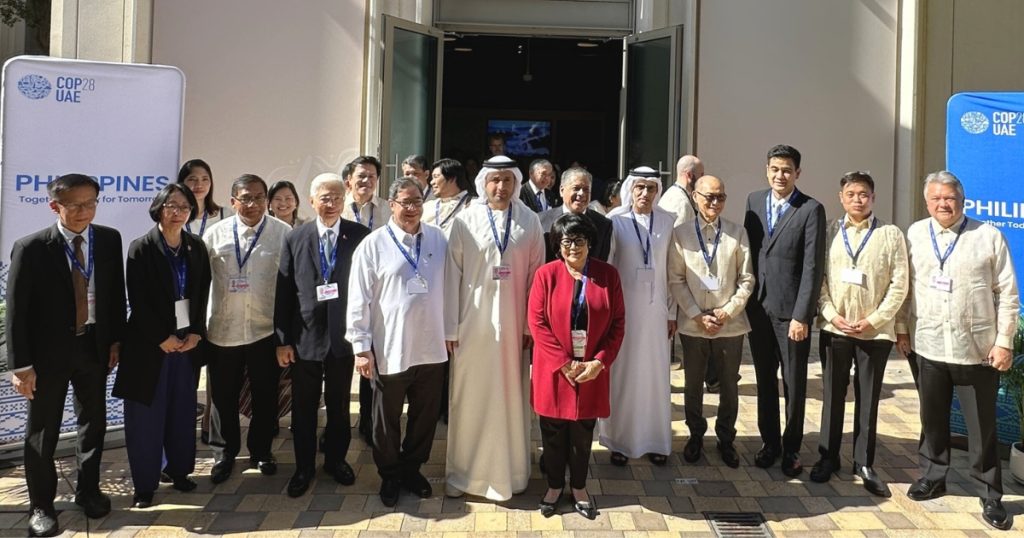The Philippines marked its presence at the 28th Conference of Parties to the United Nations Framework Convention on Climate Change (COP28) with the opening of its dedicated pavilion at the Expo City Dubai on Friday, December 1. The ceremony, graced by high-level officials showcased the country’s unwavering commitment to combatting climate change.

A ribbon-cutting ceremony officially opened the COP28 Philippine Pavilion, led by Environment and Natural Resources Secretary and Climate Change Commission Chairperson-designate Sec. Maria Antonia Yulo Loyzaga and joined in by Special Assistant to President Antonio Lagdameo Jr., Secretary Benjamin E. Diokno of the Department of Finance (DOF), Secretary Raphael P. M. Lotilla of the Department of Energy (DOE), Secretary Teodoro Herbosa of the Department of Health (DOH), Secretary Renato U. Solidum, Jr., Department of Science and Technology (DOST), Hon. Robert E. A. Borje, Vice Chairperson and Executive Director of the Climate Change Commission (CCC), Secretary Alfredo Pascual of the Department of Trade and industry (DTI), and Usec. Hans Leo Cacdac of the Department of Migrant Workers (DMW).
Also present during the opening ceremony His Excellency Alfonso Ferdinand Ver, Philippine Ambassador to the UAE and His Excellency Mohamed Obaid Alqataam Alzaabi, UAE Ambassador to the Philippines.

Secretary Loyzaga delivered a compelling welcome message, emphasizing the country’s dedication to limiting the global temperature rise to 1.5°C.
“The pavilion manifests the Philippines’ commitment to climate action and resilience. It’s designed to convey our country’s contribution to local, national, and global climate challenges and is underpinned by three pillars that are embodied in our Philippine Development Plan of 2023-2028. First our rich biodiversity and our capacity for nature-based and gray-green solutions towards ecosystem-based adaptation, mitigation, and disaster risk reductions,” said Sec. Loyzaga.

The Philippines, in line with its commitment to limiting the temperature rise to 1.5°C, has partnered with the private sector and development partners – including Ayala Corporation, the first conglomerate in the Philippines to commit to a Net Zero Greenhouse Gas Emissions (GHG) by 2050.

Ayala Corporation – through ACEN, its dedicated renewable energy subsidiary – is speaking in this year’s COP28 about its Energy Transition Mechanism (ETM) project, the world’s first, and will be engaging in knowledge exchange, fostering idea-sharing among international key leaders.

The ETM project, showcased by Ayala Corporation’s renewable energy subsidiary ACEN, aims to accelerate the retirement of the South Luzon Thermal Energy Corporation (SLTEC) coal plant by 2040. This ambitious move, 15 years ahead of the plant’s original end-of-life date, is anticipated to prevent up to 50 million metric tons of CO2 emissions, contributing significantly to a cleaner and sustainable energy landscape.

“We are very proud to have made a net zero commitment in 2021. We are working diligently to implement that plan and reach that point, which is keeping us busy on the sustainability front. We’ve been very fortunate that we’ve had visionary leaders throughout history including Fernando Zobel de Ayala who was the President and CEO of Ayala Corp at that time who’ve been able to look at the long term. At Ayala Corporation, we really got the benefits of being able to look at investment decisions in the long term. It’s also an incredibly proud moment that we are sharing ACEN’s ETM success with the world. In addition to sharing, we are here to learn as well,” said Jaime Z. Urquijo, Chief Sustainability and Risk Officer of Ayala Corporation.

The COP28 Pavilion opening also hosted a side event titled “Exploring the Nexus: Migration and Climate Change,” reflecting the Philippines’ commitment to addressing the interconnected challenges posed by climate change.
The Philippines will host over 30 panel discussions, presentations, and networking opportunities at the country’s pavilion. The delegation aims to amplify calls for developed nations to fulfill commitments to developing countries in climate finance, technology transfer, and capacity-building.





